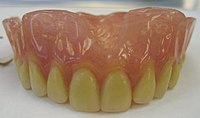
Photo from wikipedia
The data about bond strength between digitally produced denture base resins and artificial teeth are scarce. Several studies investigated shear bond strength values of milled denture base resins and different… Click to show full abstract
The data about bond strength between digitally produced denture base resins and artificial teeth are scarce. Several studies investigated shear bond strength values of milled denture base resins and different types of artificial teeth. The purpose of the present study was to compare and evaluate the available evidence through a systematic review. A bibliographic search was conducted in PubMed, Scopus, and Web of Science to assess adequate studies published up to 1 June 2022. This review followed the PRISMA (Preferred Reporting Items for Systematic Reviews and Meta-Analyses) guidelines. The appropriate studies that determined the shear bond strength values between milled denture base resins and artificial teeth were selected. The initial search identified 103 studies, which were included in the PRISMA 2020 flow diagram for new systematic reviews. Three studies met the inclusion criteria, and all of them present a moderate risk of bias (score 6). Two studies found no statistical differences between heat-polymerized and CAD/CAM (milled) denture base materials when attached with different types of artificial teeth, while one study showed higher values of CAD/CAM (milled) denture base materials. Bonding agents ensure bonding strength at least similar to the conventional methods. In order to improve the quality of future studies, it would be advantageous to use a larger number of specimens with standardized dimensions and a blinded testing machine operator to decrease the risk of bias.
Journal Title: Dentistry Journal
Year Published: 2023
Link to full text (if available)
Share on Social Media: Sign Up to like & get
recommendations!